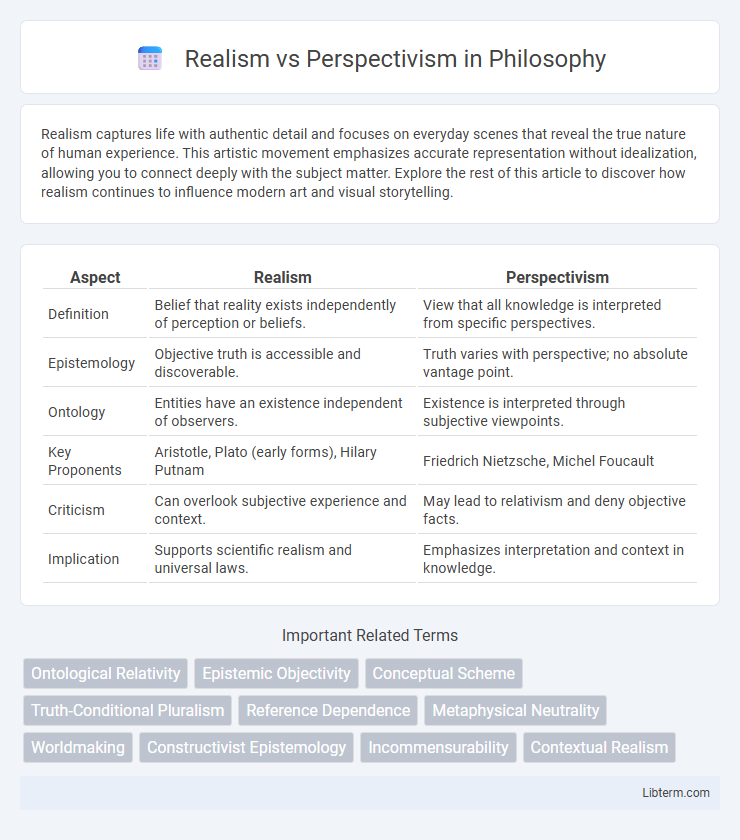Realism captures life with authentic detail and focuses on everyday scenes that reveal the true nature of human experience. This artistic movement emphasizes accurate representation without idealization, allowing you to connect deeply with the subject matter. Explore the rest of this article to discover how realism continues to influence modern art and visual storytelling.
Table of Comparison
| Aspect | Realism | Perspectivism |
|---|---|---|
| Definition | Belief that reality exists independently of perception or beliefs. | View that all knowledge is interpreted from specific perspectives. |
| Epistemology | Objective truth is accessible and discoverable. | Truth varies with perspective; no absolute vantage point. |
| Ontology | Entities have an existence independent of observers. | Existence is interpreted through subjective viewpoints. |
| Key Proponents | Aristotle, Plato (early forms), Hilary Putnam | Friedrich Nietzsche, Michel Foucault |
| Criticism | Can overlook subjective experience and context. | May lead to relativism and deny objective facts. |
| Implication | Supports scientific realism and universal laws. | Emphasizes interpretation and context in knowledge. |
Introduction to Realism and Perspectivism
Realism asserts that reality exists independently of human perceptions, emphasizing an objective world that can be observed and understood through scientific inquiry. Perspectivism challenges this by arguing that all knowledge is interpretative, shaped by individual perspectives, cultural contexts, and historical conditions. The debate between realism and perspectivism centers on whether truth is absolute or contingent on subjective viewpoints, influencing epistemology and ontology across philosophy.
Historical Origins: Realism vs Perspectivism
Realism, rooted in ancient Greek philosophy with philosophers like Plato and Aristotle, asserts that an objective reality exists independent of human perception. Perspectivism, first articulated by Friedrich Nietzsche in the 19th century, challenges absolute truths by emphasizing the subjective interpretation shaped by individual perspectives and cultural contexts. These historical origins highlight the fundamental philosophical shift from a fixed external reality to a more fluid, interpretive understanding of truth.
Core Principles of Realism
Realism centers on the belief that an objective reality exists independently of human perception, emphasizing facts and truths that remain constant regardless of individual viewpoints. Core principles include the existence of an external world, the reliability of sensory experience to discover truths, and the notion that knowledge corresponds to reality. This framework contrasts with perspectivism, which holds that all knowledge is shaped by subjective perspectives and contexts.
Fundamental Concepts in Perspectivism
Perspectivism challenges the notion of an absolute reality by asserting that all knowledge and truth are inherently tied to specific viewpoints shaped by cultural, historical, and cognitive frameworks. It emphasizes the plurality of perspectives, suggesting that reality is perceived differently depending on the observer's unique context, thereby rejecting the universal claims of traditional realism. Key concepts in perspectivism include interpretive flexibility, the situatedness of knowledge, and the multiplicity of valid perspectives, which collectively highlight the complexity and subjectivity underlying human understanding.
Key Differences Between Realism and Perspectivism
Realism asserts that reality exists independently of human perception, emphasizing objective truths and facts. Perspectivism, on the other hand, argues that knowledge and truth are always influenced by subjective perspectives, meaning reality is interpreted through various viewpoints. Key differences include realism's commitment to absolute truth versus perspectivism's acceptance of multiple, context-dependent truths shaped by individual or cultural perspectives.
Major Philosophers and Their Contributions
Realism, championed by philosophers such as Aristotle and Thomas Aquinas, posits that reality exists independently of human perception, emphasizing objective truth and universal properties. In contrast, Perspectivism, notably advanced by Friedrich Nietzsche, argues that knowledge is always from a particular perspective, rejecting absolute truths in favor of relative interpretations shaped by individual viewpoints. These philosophical frameworks fundamentally differ in their understanding of truth, with Realism advocating for an external reality and Perspectivism highlighting the subjective nature of human experience.
Realism and Perspectivism in Science
Realism in science asserts that scientific theories aim to accurately describe an objective reality independent of human perspectives, emphasizing the existence of unobservable entities such as electrons or black holes. Perspectivism challenges this by arguing that scientific knowledge is always shaped by particular perspectives, instruments, and theoretical frameworks, leading to multiple, sometimes incommensurable, interpretations of reality. This debate influences how scientists understand the status of scientific theories, the nature of truth, and the objectivity of empirical data within the scientific process.
Criticisms and Debates
Realism faces criticism for its assertion of objective truths independent of human perception, which perspectivists argue oversimplifies complex reality by ignoring the influence of cultural and individual viewpoints. Perspectivism is debated for potentially leading to relativism, where the absence of absolute truths challenges the possibility of universal knowledge or ethical standards. These philosophical tensions fuel ongoing debates about epistemology, truth, and how knowledge is constructed across disciplines.
Practical Implications in Modern Thought
Realism posits that objective truths exist independently of perception, influencing modern science and law by emphasizing universal principles and consistent facts. Perspectivism argues that knowledge and truth are inherently tied to individual or cultural viewpoints, shaping disciplines like ethics and politics to recognize pluralism and context sensitivity. Both frameworks affect decision-making processes, with realism guiding standardized methodologies and perspectivism promoting adaptive, situational understanding in contemporary thought.
Conclusion: The Continuing Dialogue
Realism asserts that an objective reality exists independently of our perceptions, while perspectivism emphasizes that knowledge is inherently shaped by individual perspectives and contexts. The ongoing dialogue between these philosophies enriches epistemological debates by challenging the absoluteness of truth and encouraging a nuanced understanding of reality. This dynamic interplay highlights the importance of integrating both objective observations and subjective interpretations in constructing knowledge frameworks.
Realism Infographic

 libterm.com
libterm.com